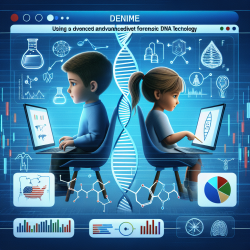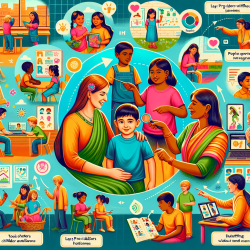Introduction
In the rapidly evolving field of forensic biology and DNA typing, the INTERPOL review from 2019-2022 has highlighted numerous advancements that can be leveraged to improve practices in various fields, including online therapy services for children. This blog aims to explore how practitioners can implement these research outcomes to enhance their skills and encourage further research, ultimately leading to better outcomes for children.
Key Advances in Forensic DNA Typing
The INTERPOL review outlines significant developments in forensic DNA analysis, including rapid DNA testing, next-generation sequencing (NGS), and investigative genetic genealogy. These advancements have implications beyond forensic science, offering potential applications in fields like speech-language pathology and online therapy services.
Implementing Research Outcomes in Online Therapy
Practitioners providing online therapy services can benefit from understanding the principles of DNA typing and its applications. Here are a few ways these advancements can be integrated into practice:
- Data-Driven Decision Making: Just as forensic scientists use DNA data to make informed decisions, therapists can utilize data-driven approaches to tailor interventions and track progress in children, ensuring personalized and effective therapy.
- Privacy and Ethical Considerations: The review emphasizes the importance of privacy and ethical issues in DNA databases. Similarly, online therapy services must prioritize data privacy and ethical considerations when handling sensitive information about children and their families.
- Innovative Techniques: The use of advanced technologies like NGS in forensic science can inspire therapists to adopt innovative tools and techniques in their practice, such as virtual reality or AI-driven assessments, to enhance engagement and outcomes for children.
Encouraging Further Research
The INTERPOL review highlights the need for ongoing research to address challenges in forensic biology. Practitioners in online therapy can also contribute to research by:
- Collaborating with Researchers: Engaging in interdisciplinary collaborations with researchers in forensic science can lead to new insights and approaches that benefit both fields.
- Participating in Studies: By participating in research studies, therapists can help generate data that informs best practices and improves therapy outcomes for children.
- Advocating for Funding: Supporting initiatives that fund research in both forensic science and child therapy can drive innovation and lead to better outcomes for children.
Conclusion
The advancements in forensic biology and DNA typing outlined in the INTERPOL review offer valuable insights and applications for practitioners in online therapy services. By implementing these research outcomes and encouraging further research, therapists can enhance their skills and contribute to improved outcomes for children. To read the original research paper, please follow this link: Recent advances in forensic biology and forensic DNA typing: INTERPOL review 2019–2022.










